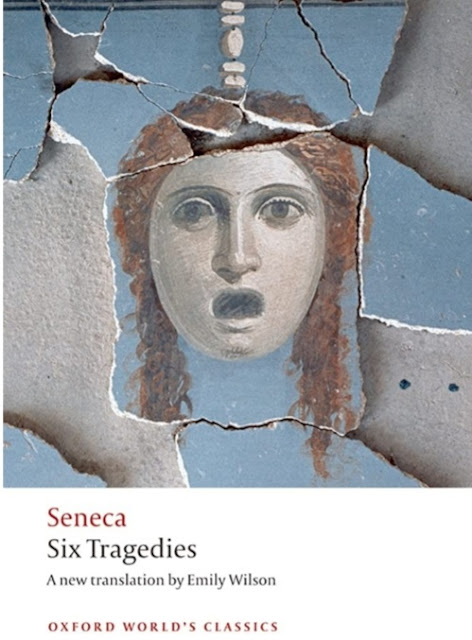Phaedra by Seneca - 54 A. D. --from Seneca:Six Tradgedies: Translated by Emily Wilson - 2010
An Ancient Reads Post
An Autodatic Corner Work
"‘Seneca cannot be too heavy, nor Plautus too light’" - Hamlet, II,ii,395
Seneca
Born - 4 B. C. E. - Cordoba, Spain
49 A.D. -appointed Advisor to Nero
Died- 65 A. D. - Rome, Italy - ordered to commit suicide for his alleged role in a conspiracy to murder Emperor Nero
This is my first venture into Roman drama. I grateful to Emily Wilson for her highly informative introduction to this collection. She provides an illuminating account of the influence of the tribulation in Roman imperial politics had on Seneca's life and his involvement with Nero.
Several of Seneca's plays have counterpart in Greek Tradgedies. For Phaedra this is Hippolytus by Euripides. Wilson helped me to understand the differences between Seneca's work and Greek Tradgedies.
"Readers who come to Seneca fresh from Athenian tragedy may miss the lightness, the irony, the possibility of open-ended dialogues between one character and another, or between human beings and the gods. Above all, we miss the sense of community. . Seneca’s tragedies focus less on the relationships of people to one another, and more on the relationship of individuals to their own passions. These plays are far darker, but also often much funnier, than their Athenian equivalents." From the Introduction
The plays of Seneca influenced Shakespeare, Racine, Ben Johson and other dramatists. If Time is permitted to me by the capricious Gods, I hope to reread the plays Wilson mentions.
Wilson elegantly lays out the contrasts of Seneca's treatment of the myth of Phaedra with that of Euripides:
"In comparison with Athenian tragedy, Seneca’s plays focus less on the workings of the divine in human life and more on the conflicts within human nature itself. For example, Seneca’s Phaedra is based on the same story as Euripides’ Hippolytus. Euripides’ play is framed by two goddesses: Aphrodite, goddess of love and sex, who speaks the prologue; and Artemis, goddess of the hunt and of chastity, who appears to the dying Hippolytus in the penultimate moments of the play. It that Phaedra’s incestuous passion and Hippolytus’ excessive chastity are two extreme sides of the same spectrum. Seneca removes the divine machinery, to create a drama about the conflict between passion and self-control within the human psyche."
Educated Roman's, as reflected in the writing of period historians had come by 50 A.D. to view Roman society as entering a period of decadence and depravity, far from the glory days of Rome.
In Reading Phaedra I see the darkness, the lack of community but I admit I found nothing funny in this play. I do find more hatred, little regard for the morality of the often cruel and capricious Gods.
Stoicism is based on the idea that a failure to control human passions, Greed, lust and desire for material wealth are the sources of human misery. (I will obseve when long ago I read the stoical Meditations of Marcus Aurelius i thought, "Easy for an Emperor to say this) The picture of the sexual obsessions of Phaedra paint a troubling view of the impact of sexual passion on women.
There is less use of the Chorus in Seneca's dramas.
Here are the closing lines of the play as Theseus laments his role in the murder of his son and curses Phaedra:
"What can this be, so ugly, disgusting, pierced all over with multiple wound.
I do not know what part it is, but I know it belongs to you; Put it here: not where it belongs, but where a space is empty.
Is this your face, which used to shine with starry fire, your spirited, piercing gaze? Has your beauty come to this?
O terrible fate, O cruelly-helpful gods! Is this the answer to a father’s prayer, a son’s return? Here are the final gifts your father gives you.
You will need multiple burials... Meanwhile, burn these parts. Open the house: it stinks of death
. Let all the land of Attica ring loud with piercing funeral cried
. You, make ready the flame for the royal pyre, and you, go out and seek the missing parts of the body scattered in the country.
And as for that woman—bury her, and may the heavy earth crush down on her"
Emily Wilson is the College for Women Class of 1963 Term Professor in the Humanities, professor of Classical Studies, and graduate chair of the Program in Comparative Literature & Literary Theory at the University of Pennsylvania. Wilson attended Oxford University (Balliol College B.A. and Corpus Christi College M.Phil.) and Yale University (Ph.D.). In 2006, she was named a Fellow of the American Academy in Rome in Renaissance & Early Modern scholarship. In 2019 she was named a MacArthur Fellow, and in 2020 she was named a Guggenheim Fellow. She lives in Philadelphia with her three daughters, three cats, two rats, and one dog.
Follow Professor Wilson on Twitter @EmilyRCWilson. Professor Wilson frequently tweets about the Odyssey, translation, and her pets. From https://www.emilyrcwilson.com/
There are links to links to several articles by Wilson as well as several interviews on her website.
The next play by Seneca I will read is his Trojan Women.
Mel Ulm










